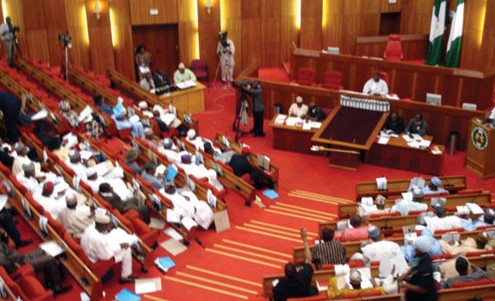
The bill titled: Compulsory Treatment and Care of Victims of Gunshots Bill, was sent to the upper legislative chamber for concurrence.
The bill mandates all hospitals in Nigeria to commence immediate treatment of such victims whether or not payment has been made by the victim of those who brought him to the hospital.
The normal practice for hospitals is to get approval from the security agency and in most cases, payment before commencing treatment of any victim with a gunshot wound.
However, the Presient of the Senate Dr. Bukola Saraki while congratulating his colleagues on the passage of the bill stressed that many people with gunshot wounds were not criminals.
He said that the unnecessary loss of lives occasioned by the long time required to obtain clearance to treat such unfortunate victims of gunshot should not be entertained.
He said that it was that reason that it becomes important that a legal framework be put into place to avoid unnecessary loss of lives.
“By the passage of this Bill, the Senate has moved to ensure that every hospital in Nigeria, both public and private, must accept to treat victims of gunshot wounds without any clearance from the police.
“What we have done is to ensure that everyone is entitled to medical treatment, irrespective of the cause of the shooting.
“We should reserve judgment for the criminal justice system, and leave healthcare for the medical professionals,” he said.
The bill also stipulates that everybody including security agents should render every possible assistance to any person with gunshot wounds and ensure that the person is taken to the nearest hospital for treatment.
Additionally, the Bill mandates that no person with gunshot wounds shall be refused immediate and adequate treatment by any hospital in Nigeria whether or not initial monetary deposit is paid.
Other Bills passed by the Senate on Tuesday include: Animal Health and Husbandry Technologies (Registration, etc) Bill, 2017 (HB. 320); Corporate Manslaughter Bill, 2017 (HB. 273); National Child Protection and Enforcement Agency Bill, 2017 (HB. 127); National Intelligence Agency Pension Board Bill, 2017 (HB. 842); Nigerian Academy of Science Bill, 2017 (HB. 917); and the National Postgraduate College of Medical Laboratory Science Bill (HB. 405).
This brings the total number of Bills passed by the 8th Senate to 108 Bills.
The bills will be forwarded to the President for assent. If the president gives his assent then they will become laws of the Federal Republic of Nigeria.